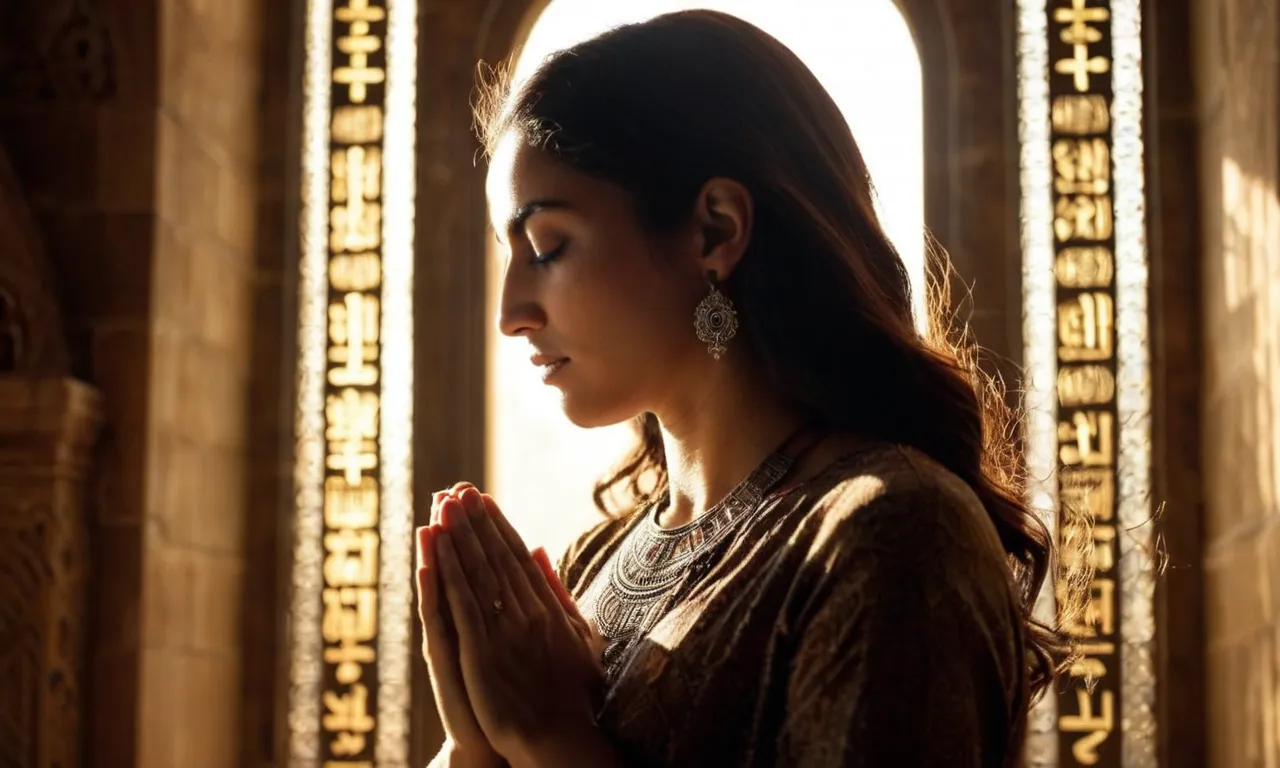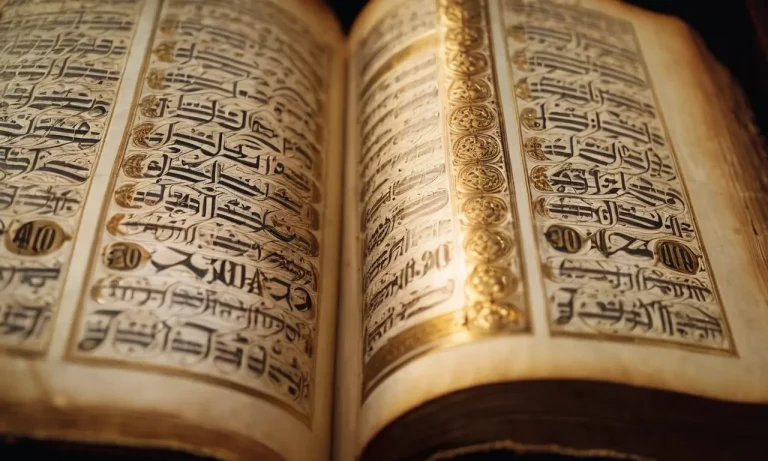The God Who Sees Me In Hebrew
The God who sees. A comforting phrase for many, but what does it actually mean? In Hebrew, the name El Roi reveals the meaning behind the God who sees me.
If you’re short on time, here’s the quick answer: In Hebrew, El Roi means ‘God of seeing’ or ‘God who sees me’. It comes from the story in Genesis of Hagar who was seen and cared for by God in the wilderness.
In this nearly 3000 word article, we will explore the meaning behind El Roi, the Hebrew name for the God who sees. We’ll cover: the Biblical origins of El Roi from Genesis 16 and 21; Hebrew word study on El Roi; how God sees and cares for us; why God’s sight is a comfort; and how we can respond to the God who sees us.
The Origins of El Roi in Genesis 16 and 21
Hagar’s Story in Genesis 16
Hagar’s story begins when Sarai, Abram’s wife, gives Hagar to Abram so that she can bear children through her (Genesis 16:1-3). After Hagar conceives, tension arises between the two women, and Sarai deals harshly with Hagar, causing her to flee into the wilderness (Genesis 16:4-6).
There, the Angel of the Lord comes to her and instructs her to return and submit to Sarai. He also tells her that her descendants will be too numerous to count (Genesis 16:7-12). In response, Hagar names God “El Roi,” meaning “the God who sees me,” recognizing that He truly saw her plight and intervened on her behalf (Genesis 16:13-14).
This encounter demonstrates God’s compassion and care for marginalized people like Hagar.
Hagar Names God in Genesis 21
In Genesis 21, after Isaac is born, conflict again arises between Sarah and Hagar. This time, Sarah requests that Abraham banish Hagar and Ishmael, presumably because she feels threatened by Ishmael’s status as Abraham’s son (Genesis 21:8-10).
Distraught, Abraham reluctantly agrees, and sends them away with provisions. However, they soon run out of water in the wilderness of Beersheba (Genesis 21:14-16). With Ishmael near death, Hagar prepares to die alongside him under some bushes.
At that moment, the Angel of God intervenes again and shows her a nearby well, saving both their lives (Genesis 21:17-19). The passage states “God was with the boy as he grew up” (Genesis 21:20), which shows God’s ongoing protection and blessing on Ishmael despite his banishment.
This second divine encounter again demonstrates God’s compassionate care and attention, and leads Hagar to once more name Him “El Roi” (Genesis 21:16).
The website Bible Study Tools notes the significance of this name, stating that each time Hagar uses it for God she is “recognizing Him as a personal God who saw her in her time of deepest need.” Her seemingly hopeless situation as an Egyptian slave and then exiled single mother drew God’s watchful eye and gracious intervention.
As El Roi, He truly saw her and knew her name. This remains true for all who suffer injustice, oppression or abandonment – El Roi sees each one and can act with divine compassion on their behalf.
Hebrew Word Study on El Roi
The Meaning of El
The Hebrew word ‘El’ is a common designation for God in the Old Testament. In the Hebrew Bible, ‘El’ is often used in combination with other names and titles of God, as in ‘El Elohim’ (God of gods), ‘El Shaddai’ (God Almighty), and ‘El Olam’ (The Everlasting God).
‘El’ comes from the word meaning power or might. As a name for God, ‘El’ emphasizes God’s strength, sovereignty, and supremacy. ‘El’ has the idea of the God who presides over all other powers and authorities.
The Meaning of Roi
The Hebrew word ‘Roi’ means to “see”. It comes from the root Hebrew verb raah, which has a wide range of meaning related to perception, including to see, look, observe, envision, and understand. So you could translate it sees, is seeing, or keeps on seeing.
The form ‘Roi’ is a variant of the word ree, meaning “my shepherd”.
‘Roi’ emphasizes the personal, relational aspect of seeing. In Hebrew thought, true seeing goes beyond just physical sight. To “see” also includes a mental awareness and spiritual discernment. So ‘Roi’ denotes a God who constantly watches, perceives, understands, and cares.
Put Together – El Roi Means “The God Who Sees”
When the names ‘El’ and ‘Roi’ are combined – ‘El Roi’ – the meaning is powerful: “The God Who Sees”. This highlights both God’s power over all, as well as His personal, loving care towards each individual. The God who is supreme over all creation also sees and knows each person intimately.
The name ‘El Roi’ first appears in Genesis 16, where Hagar realizes she has encountered the God “who sees me”. This God had not abandoned her in distress but had come to her personally. Throughout Scripture, ‘El Roi’ continues as a reminder that we worship a God who is all-powerful, yet also ever-present to see and care for His people.
How God Sees and Cares For Us
God Sees Our Physical Circumstances
The Bible tells us that God sees everything we go through in life. He sees our struggles, our pain, our heartaches. King David wrote in Psalm 31:7, “I will be glad and rejoice in your love, for you saw my affliction and knew the anguish of my soul.” God sees the very depths of our circumstances.
He also sees our physical needs. When the Israelites were wandering in the wilderness, God saw their hunger and provided manna from heaven (Exodus 16:4-15). Jesus had compassion on the hungry crowds and fed them miraculously (Mark 6:30-44). Our Creator cares deeply about our physical circumstances.
God Sees Our Innermost Being
Not only does God see our outward circumstances, but He also sees our innermost being. The book of Hebrews says, “Nothing in all creation is hidden from God’s sight. Everything is uncovered and laid bare before the eyes of him to whom we must give account” (Hebrews 4:13).
God sees our innermost thoughts, desires, and motivations. He knows us better than we know ourselves! King David prayed, “Search me, God, and know my heart; test me and know my anxious thoughts” (Psalm 139:23).
It is comforting to know that even when we cannot make sense of our own hearts, God sees us fully and understands us completely.
Examples of God Seeing People in Scripture
Throughout Scripture, we find examples of God “seeing” people in their unique circumstances:
- When Hagar fled into the wilderness, pregnant and despised, the angel of the Lord found her and said, “The Lord has seen your affliction” (Genesis 16:11-14).
- God saw the suffering of the Israelites in Egypt and said, “I have indeed seen the misery of my people in Egypt. I have heard them crying out” (Exodus 3:7).
- After David’s sin with Bathsheba, he confessed, “You God see my affliction” (Psalm 31:7).
- When Leah felt unloved in comparison to Rachel, God saw she was unloved and opened her womb (Genesis 29:31).
These examples show God’s intimate care and compassion. He sees our pain and meets us in our points of need. No human struggle escapes His notice or exists outside His awareness. The God who sees reaches out to us in our affliction.
Why God’s Sight is a Comfort
We Are Not Alone
God’s constant sight can bring great comfort, assuring us that we are never truly alone. As Psalm 139:7-10 declares, there is nowhere we can go where God does not see us. Whether we ascend to the heavens or make our bed in the depths, God is ever present.
This means we have a constant companion in all of life’s joys and struggles. We may sometimes feel isolated and abandoned by others, but God sees and knows us in those lonely times.
We Are Valued and Known
In addition, God’s sight signifies value and care. An omniscient God sees everything, yet he intentionally fixes his gaze upon us. As Psalm 8:4 asks, “What is mankind that you are mindful of them?” Out of all his creation, God chooses to focus his attention on humanity.
This suggests we have inherent worth to God. He takes the time to truly see us – our talents and flaws, sorrows and triumphs. As Psalm 139:13 declares, it was God who knit us together and saw our unformed body. Every intricate detail of our identity captures his interest and affection.
God Cares About Our Needs
Moreover, the fact that God sees our struggles means he is aware of our needs. As Matthew 6:8 states, “Your Father knows what you need before you ask him.” When we hurt, God sees our pain. When we face uncertainty, he sees our doubts and fears.
According to Matthew 6:25-34, the God who feeds the birds of the air and clothes the lilies of the field will also provide for our every need. He is actively looking out for us, wanting to offer aid and guidance amidst life’s storms.
Rather than seeing our troubles and turning away, God draws near in compassion as the loving Father he is.
Responding to the God Who Sees
Turn to Him in Prayer
When we realize that God sees and knows us fully, it should move us to turn to Him in prayer. As David says in Psalm 139, there is nowhere we can flee from God’s presence. He is everywhere, and He knows our thoughts even before we speak them.
Knowing this can be intimidating at first, but it is also incredibly freeing. We do not need to pretend to be someone we’re not before God or hide our true feelings and struggles. He already sees them anyway!
Turning to God in honest, vulnerable prayer allows us to cast our cares upon Him, trusting that He understands us better than we understand ourselves (1 Peter 5:7). Amazing peace comes when we stop trying to hide and instead run to the God who sees us just as we are.
Worship the God Who Sees
Not only does El Roi see everything we do, but He also sees for us – nothing escapes His notice (Hebrews 4:13). When Hagar was alone and afraid in the wilderness, God saw her affliction and intervened on her behalf. As one of His children, God also sees and cares for you.
He knows exactly what you need and promises to provide it (Matthew 6:32). This should fill us with praise for our compassionate, all-seeing Father! When you worship, focus on God’s intimate knowledge of you. Thank Him that He cares about even the smallest details of your life.
Praise Him for watching over you and meeting your needs. Worship fills our hearts with awe for the God who sees.
Tell Others About El Roi
Once we have encountered the God who sees us, it is natural to want to tell others about Him! Everyone around us is also seen and known by God, whether they realize it or not. When we share our experiences about how El Roi has met us in our pain, forgiven our sin, and answered our prayers, it can help draw others to Him as well.
As you talk about your faith, highlight the comfort that comes from God’s intimate knowledge of you. Emphasize His tender care and compassion, not just His omniscience. Remind people that God is for them, not against them.
He sees their struggles and wants to intervene on their behalf, just as He did for Hagar. There are so many who need to meet El Roi!
Conclusion
The God who sees me. In Hebrew, El Roi reveals the meaning behind this powerful phrase. Through Hagar’s story and the Genesis narratives, we learn that God sees, knows, and cares for each one of us.
No matter what hardship or wilderness we face, we are seen by El Roi. His sight is a comfort that reminds we are never alone or forgotten. May the God who sees continue to meet us where we’re at and walk with us every step of the way.








